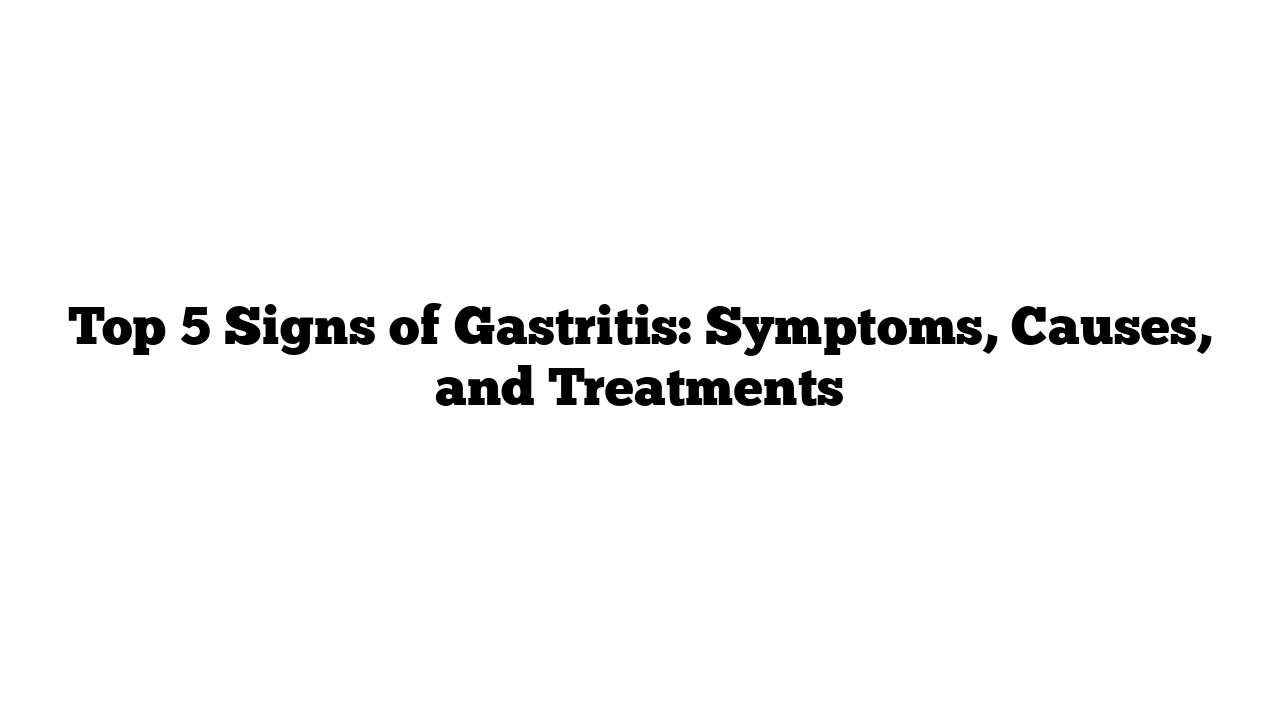Gastritis is a condition characterized by inflammation of the stomach lining, and it affects a large portion of the population. This inflammation can result from a variety of causes, including bacterial infections, stress, excessive alcohol consumption, and the regular use of non-steroidal anti-inflammatory drugs (NSAIDs).
In this article, we will discuss the top five signs of gastritis, how to diagnose and treat it, and the potential risks associated with untreated gastritis.
Top 5 Signs of Gastritis
1. Stomach Pain Stomach pain is one of the most common signs of gastritis. This pain typically occurs just below the rib cage in the upper abdomen. It is most noticeable when the stomach is empty and may be relieved by eating, as food temporarily buffers the stomach lining from gastric acid. The pain is usually described as a burning, aching, or gnawing sensation.
2. Nausea and Vomiting Another common symptom of gastritis is nausea, which may or may not be accompanied by vomiting. Nausea can occur at any time but is particularly noticeable after eating. Vomiting often follows meals, especially when the stomach lining is irritated by excess gastric acid.
3. Bloating Bloating occurs when the stomach feels swollen or full, often accompanied by belching. Gastritis causes inflammation that slows gastric emptying, which leads to food staying in the stomach longer. This prolonged presence of food can cause a feeling of fullness and increase gas production, resulting in frequent belching.
4. Loss of Appetite Due to delayed gastric emptying, people with gastritis often experience a reduced appetite. This symptom can be caused by the discomfort associated with eating, which may make food less appealing.
5. Fatigue Chronic gastritis, especially when caused by Helicobacter pylori infection, can lead to a reduction in vitamin B12 absorption, which can cause anemia. Symptoms of anemia include fatigue, weakness, pale skin, and shortness of breath.
Causes of Gastritis
The most common cause of gastritis is a Helicobacter pylori infection, which affects a significant portion of the global population. Other causes include:
- Overuse of NSAIDs (ibuprofen, aspirin)
- Excessive alcohol consumption
- Stress
- Certain spicy or acidic foods
- Autoimmune processes (leading to pernicious anemia)
Diagnosis of Gastritis
To diagnose gastritis, doctors may use several methods:
- Endoscopy: A flexible tube with a camera is inserted down the throat to visualize the stomach lining.
- Urea breath test: To detect Helicobacter pylori infection.
- Blood tests: To check for vitamin B12 deficiencies or anemia.
- Stool tests: To detect the presence of H. pylori.
Treatment of Gastritis
Treatment for gastritis typically involves addressing the underlying cause and relieving symptoms:
- Antibiotics: To treat H. pylori infection.
- Proton pump inhibitors (PPIs): To reduce stomach acid production.
- Antacids: To neutralize stomach acid and provide quick relief.
- Cytoprotective agents: Like sucralfate, to protect the stomach lining.
In addition to medication, lifestyle changes such as avoiding NSAIDs, limiting alcohol consumption, managing stress, and making dietary adjustments can significantly improve symptoms.
Diet and Foods to Avoid
When managing gastritis, it’s important to make the right food choices:
- Foods to eat: Lean poultry, bananas, yogurt (plain and low-fat), oatmeal, and vegetables (boiled or steamed).
- Foods to avoid: Spicy foods, acidic foods, processed meats, chocolate, and carbonated drinks.
Top 5 Supplements for Gastritis
Certain supplements can aid in managing gastritis:
- Probiotics: Especially strains like Lactobacillus rhamnosus and Lactobacillus reuteri, which promote gut health.
- B12 supplements: If gastritis affects vitamin B12 levels.
- Omega-3 fatty acids: Due to their anti-inflammatory effects.
- Deglycyrrhizinated licorice (DGL): Soothes the stomach lining.
- Glutamine: An amino acid that supports gut health and healing.
Complications of Untreated Gastritis
If left untreated, gastritis can lead to severe complications such as:
- Peptic ulcers: Open sores that develop in the stomach lining.
- Atrophic gastritis: A thinning of the stomach lining, impairing its function.
- Stomach cancer: Chronic gastritis, particularly from H. pylori infection or autoimmune gastritis, increases the risk of stomach cancer.
Conclusion
Gastritis is a manageable condition with early diagnosis and treatment. By understanding the signs, causes, and treatment options for gastritis, individuals can take proactive steps toward better digestive health.
Frequently Asked Questions (FAQs)
- What is the most common cause of gastritis? The most common cause is Helicobacter pylori infection, but overuse of NSAIDs and alcohol consumption also contribute significantly.
- How can gastritis be treated at home? Home remedies include reducing stress, avoiding spicy and acidic foods, and using antacids for relief. However, medical treatment is often required for severe cases.
- Can gastritis cause long-term damage? Yes, if left untreated, chronic gastritis can lead to peptic ulcers, stomach lining thinning, and an increased risk of stomach cancer.
- Are there foods that help with gastritis? Yes, foods like oatmeal, bananas, lean poultry, and low-fat yogurt can help soothe the stomach lining and reduce symptoms.
- Can stress really cause gastritis? Yes, stress can increase gastric acid production, which may lead to gastritis symptoms.
